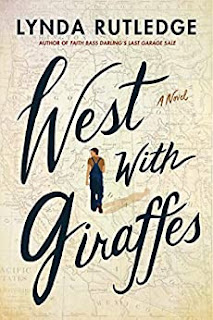Recently my book club discussed a marvelous novel entitled West with Giraffes (2021) by Lynda Rutledge. This novel is based on the true story of two giraffes at sea on their way to New York. The Great Hurricane of 1938 strikes, but the giraffes miraculously survive. As the protagonist, young Woody Nikel, reflects, “I never thought I’d see a bigger eyeful than that hurricane as long as I lived. But I was wrong. Because the last thing you think you’re going to see in the middle of flipped boats and buildings afire and bodies dangling and sirens wailing is a couple of giraffes.”
The giraffes, whose crates had
been bolted on the deck of a freighter, made it through, a bit banged up, but
alive. After a time resting and being attended to, the animals board the back
of an old truck for a trek across the United States, headed for the San Diego
Zoo. Woody and a “giraffe whisperer” Woody calls “Old Man” drive the truck and
care for the giraffes (a true part of the story). It’s a two-week trip full of
natural and human disasters, near catastrophes, and a bit of romance with a
photographer named Red.
The giraffes are the stars of this
story. The giraffes and the relationships that can develop between animals and
humans. As the book jacket notes, this book “explores what it means to be
changed by the grace of animals.” While the book is full of disasters, the
hurricane being only one of them, it is also full of natural wonders, the
giraffes being the chief example.
But what I want to write about in
this blog on aging is the frame-tale that surrounds the story. Woody Nikel is
now 105 years-old and living in a nursing home he doesn’t particularly like.
His friends are all dead and all his memories are in the far past. But the
memory of his trek with the giraffes, Old Man, and Red persists and he finds
himself thinking about them more and more. But he has long stopped trying to
tell the story, thinking it matters to no one but himself.
And then he remembers Red’s baby,
a woman now, who knows little about this part of her mother’s life. It’s like a
revelation. He reflects,
“It’s you.
“That’s when
I know I’d been a foolish and selfish man.
“It is a
foolish man who thinks stories do not matter—when in the end, they may be all
that matter and all the forever we’ll ever know. So, shouldn’t you hear our
story? Shouldn’t you know how two darling giraffes saved me, you, and your
mother, a woman I loved? And it is a selfish man who takes stories to the grave
that aren’t his and his alone. Shouldn’t you know your mother’s brave heart and
daring dreams? And shouldn’t you know your friends, even though we’re gone?
“I knew,
then, there was something else an old man could do. I found a pencil and I
began to write.”
During the first year of the
pandemic when I was especially missing contact with my family, I began thinking
of all the stories of my life that I hadn’t yet told my kids or grandkids. What
if I never got the chance? Would all those stories just disappear?
So—I found a pencil and I began to
write. Well, actually, a computer. But I spent the better part of that year in
isolation writing down the stories, starting with the ancestors, writing a
chapter on my parents, then telling stories about my growing up years, then
life as a wife and mother, as a missionary, and as a writer. Seventeen exciting
(to me) chapters. I’m leaving open the last chapter on growing older. After
all, my story’s not over.
I’m not famous and I don’t think
many people will be interested in this book. And to be honest, at this point my
kids aren’t very interested either. I’m hoping that someday some curious
granddaughter will start wondering about that funny old lady. Maybe someone (or
two or three someones) will read and love the stories, knowing a little more
about where they came from.
Maybe. Maybe not. But the stories
will not die when I do. And I get a great deal of satisfaction just knowing
that.

This is wonderful Nancy. Makes me want to keep writing my memories!
ReplyDeleteYes. You need to do that. Such an interesting life.
ReplyDelete